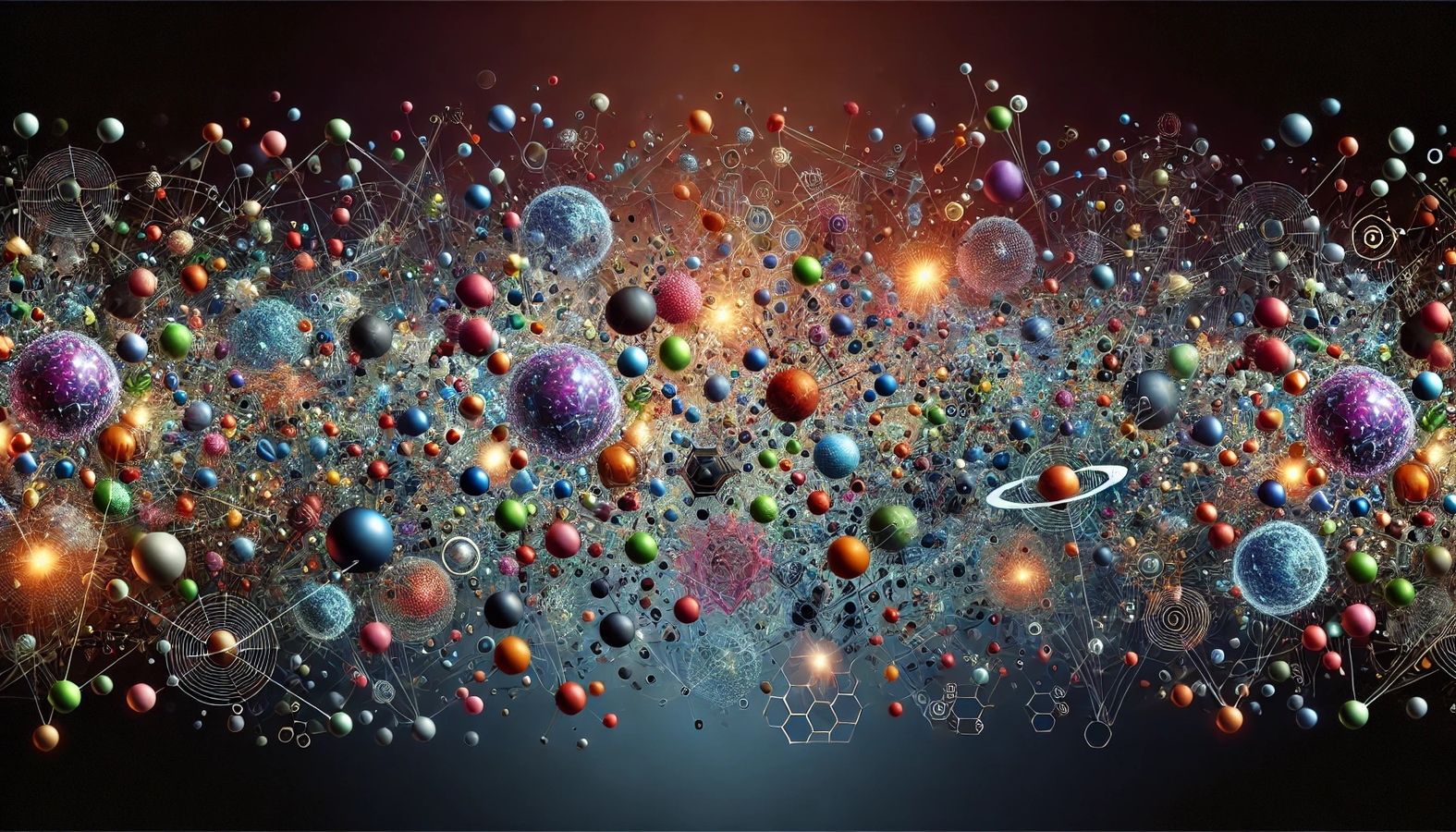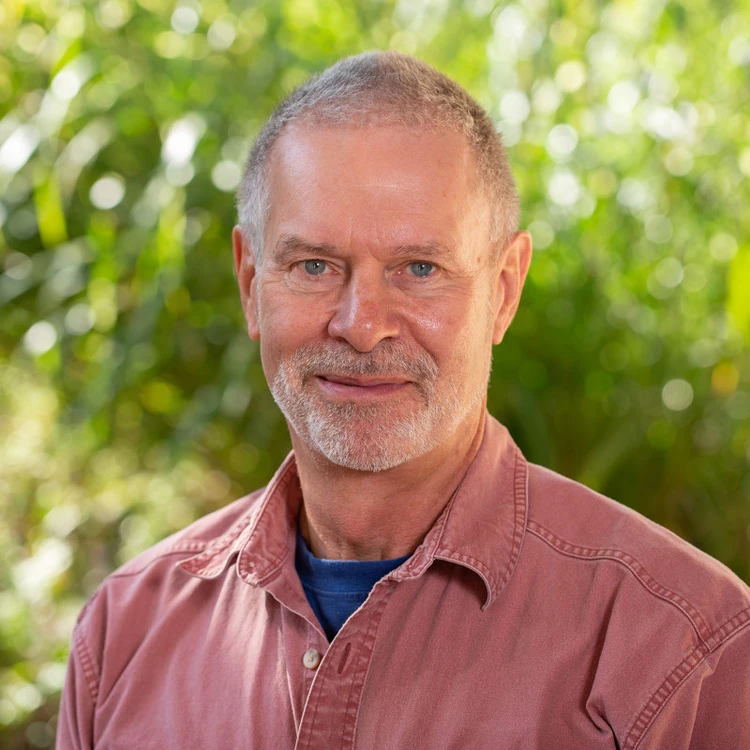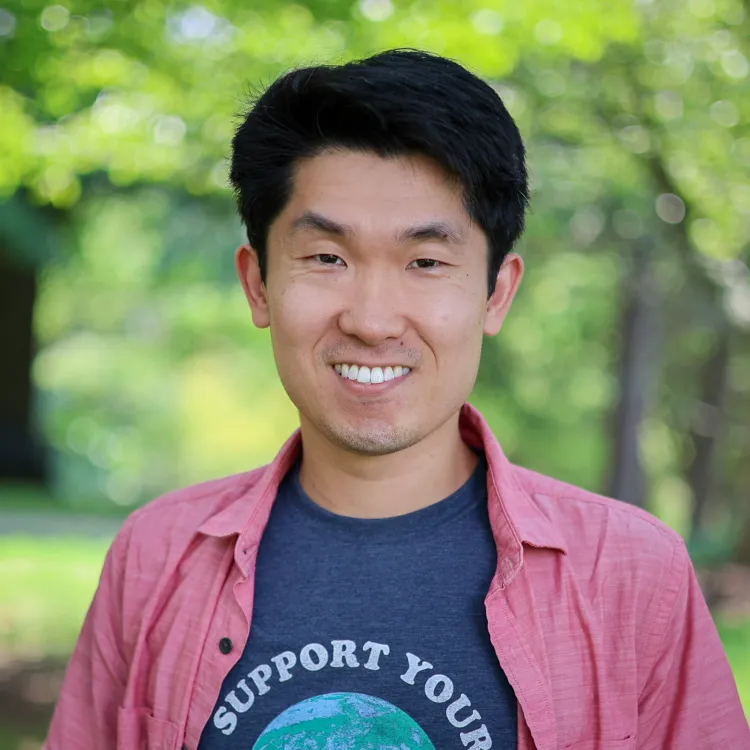For a half-century and more, scholars from diverse disciplines in physical and life sciences, anthropology, sociology, linguistics, engineering, informatics, economics, philosophy, and theology have contemplated the nature of evolving systems. Why is our universe so patterned and complex? A number of provocative ideas, including assembly theory, constructal law, dissipation-driven adaptation, emergence, open-ended evolution, and many more, are both in competition and overlapping. However, differences in vocabulary and discipline are often barriers to common understanding.
The core objective of the Workshop on Information, Selection, and Evolution is to bring together some of the world’s most thoughtful and influential thinkers from various backgrounds to listen, learn, and share ideas related to lawful, universal processes by which order arises in the cosmos.
Event Details
WISE stands for the Workshop on Information, Selection, and Evolution. The core objective of WISE is to bring together some of the world’s most thoughtful and influential thinkers from a range of backgrounds to listen, learn, and share ideas related to lawful, universal processes by which order arises in the cosmos.
WISE, which will take place October 23-25, 2024, at the Carnegie Institution’s beautiful Washington D.C. campus, will bring together 80 leading thinkers in topics related to the intertwined topics of evolution, emergence, selection, function, information, energy/entropy, statistical mechanics, and the arrow(s) of time. We want to create a forum for constructive and respectful interaction and advocacy for the wide range of creative theories and concepts that are now in play—models with many overlaps and echoes, as well as original ideas. The time is ripe to bring the wider community together to discuss shared interests and to form new interdisciplinary collaborations and working groups.
The WISE workshop will be held at the Carnegie Science Earth and Planets Laboratory, located in Northwest Washington, D.C., just west of Rock Creek Park.
The workshop will primarily be held in the Greenewalt Building (#3 on the map below).
Address:
Greenewalt Building
Earth & Planets Laboratory
Carnegie Science
5241 Broad Branch Road, NW
Washington, DC 20015
Ample parking is available on and around campus. A shuttle (Moran Transportation) will run from the hotel to the workshop each day.
For those who wish to walk, the 1.3-mile route is on sidewalks and mostly along residential streets.
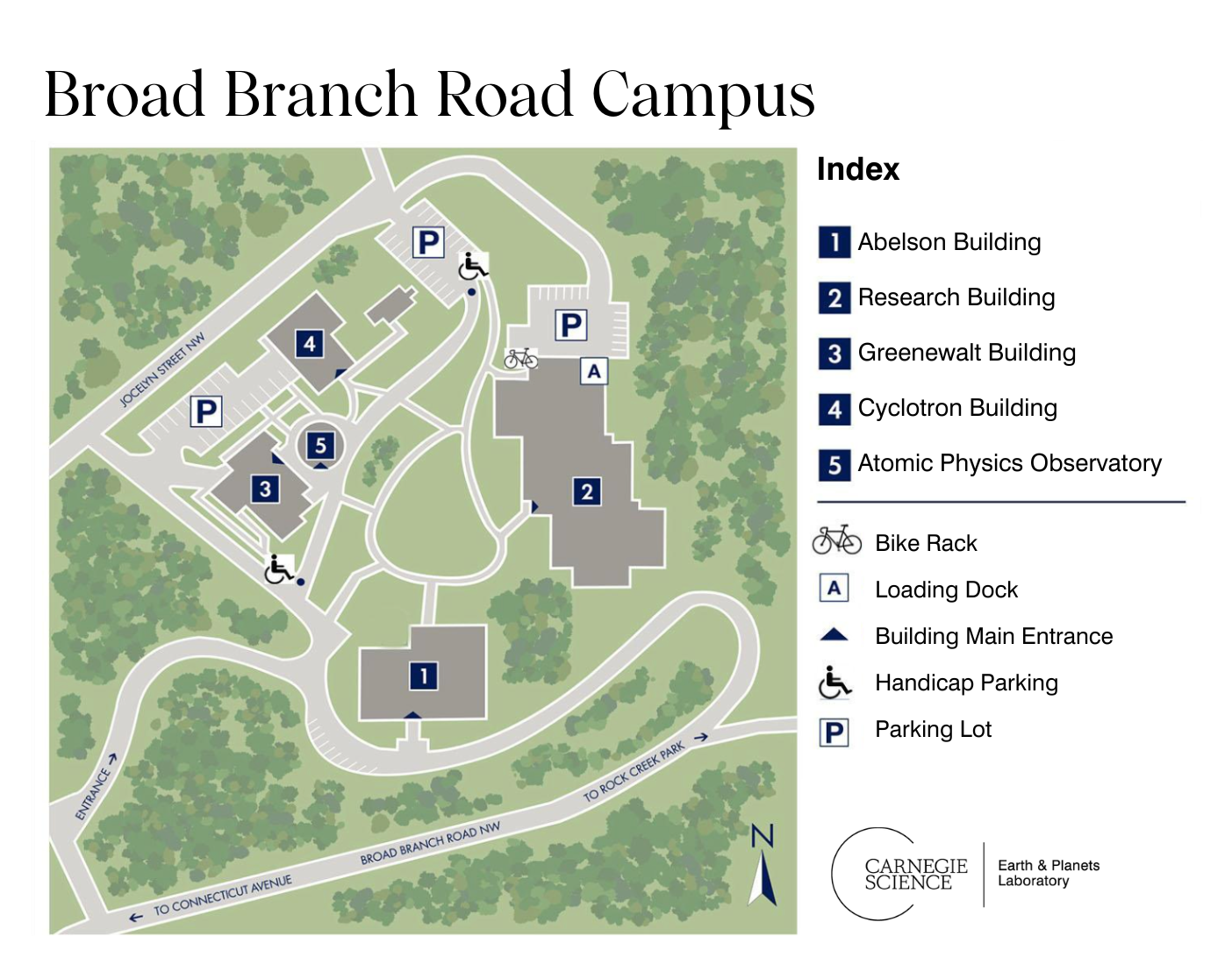
Ample parking is available on and around campus.
A shuttle (Moran Transportation) will run from the hotel to the workshop each day.
For those who wish to walk, the 1.3-mile route is on sidewalks and mostly along residential streets.
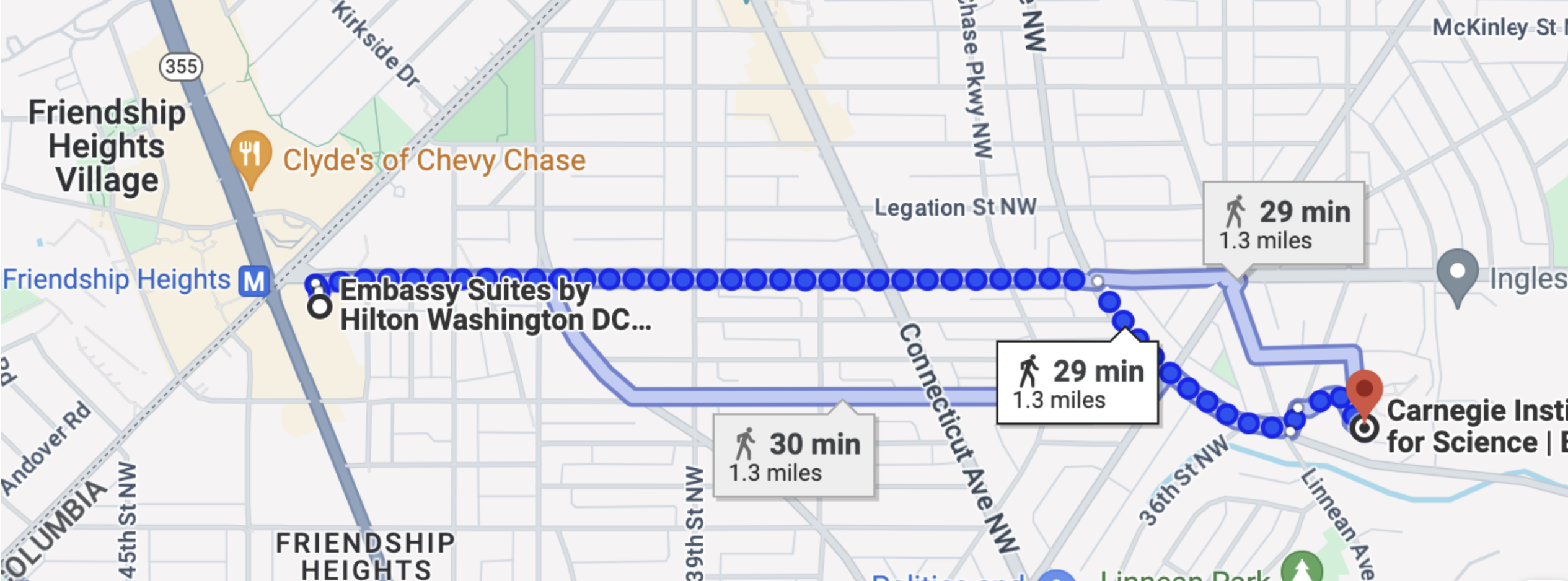
More About Campus
Reagan National Airport (DCA) is approximately nine miles and 30 minutes from EPL and the workshop hotel; Dulles International Airport (IAD) is approximately 25 miles and 40 minutes; and Baltimore-Washington International (BWI) is approximately 36 miles and 50 minutes away during non-peak travel times. Travel times by vehicle depend on traffic conditions.
Taxi/Uber is the quickest in low traffic (note that “rush hour” can extend from 7-9 AM and 3-7 PM on weekdays) but the most expensive method ($50-$120/trip depending on which airport and traffic conditions). Airport group shuttle options have become limited with the expansion of Metro in the region.
Metro is the most economical airport ground transportation ($4 DCA, $6 IAD). It is slower than vehicle travel during low traffic periods but can be quicker during rush hour. The DCA airport is directly serviced by Metro’s Yellow and Blue Lines and IAD airport is directly serviced by the Silver Line which opened in November 2022. Travelers from both airports need to transfer to the Red Line (towards Shady Grove) at Metro Center to reach the Friendship Heights Metro Station. Estimated travel time to/from DCA is 45 minutes each way and to/from IAD is 75 minutes each way. Schedules, fares, and additional trip planning information can be found at the Washington Metropolitan Area Transit Authority's website.
EPL is approximately 1.5 miles from three Metro stations on the Red Line: Van Ness-UDC (at the intersection of Connecticut Ave. and Van Ness), Tenleytown-AU (at the intersection of Wisconsin Ave. and Albemarle), and Friendship Heights (at the intersection of Wisconsin Ave. and Western Ave.).
- Danny Abrams, Northwestern University
- Chris Adami, Michigan State University
- Alyssa Adams, Cross Labs, Tokyo
- Blaise Agüera y Arcas, Google
- Rika Anderson, Carleton College
- W. Brian Arthur, Santa Fe Institute
- Gunnar Babcock, Cornell University
- Dan Costa Baciu, Münster University of Applied Sciences
- Philip Ball, Writer
- Stuart Bartlett, Caltech
- Adrian Bejan, Duke University
- Steve Benner, Foundation for Applied Molecular Evolution
- Elisa Biondi, Foundation for Applied Molecular Evolution
- Sean Carroll, Johns Hopkins University
- Francesca Cary, University of Hawaii, Manoa
- Eric Chaisson, Harvard University
- Alastair Channon, University of Keele, UK
- Irene Chen, University of California Los Angeles
- Aaron Clauset, University of Colorado, Boulder
- Jim Cleaves, Howard University
- Carol Cleland, University of Colorado Boulder
- David Deamer, University of California Santa Cruz
- Heather Demarest, University of Colorado Boulder
- Emily Dolson, Michigan State University
- James Evans, The University of Chicago
- Haleh Fotowat, Wyss Institute
- Marcelo Gleiser, Dartmouth
- Brian Greene, Columbia University
- David Grinspoon, NASA Headquarters
- Ümit Güneş, Yildiz Technical University, Istanbul, Turkey
- Robert Hazen, Carnegie Institution for Science, Washington DC
- Thomas Hertog, KU Leuven, Amsterdam
- Eric Isaacs, President Emeritus, Carnegie Institution for Science, Washington DC
- Jenann Ismael, Johns Hopkins University
- Johannes Jaeger, University of Vienna
- Kate Jeffery, The Jeffery Lab
- Sarah Stewart Johnson, Georgetown University
- Betül Kaçar, University of Wisconsin - Madison
- Gülce Kardes, CU Boulder & Santa Fe Institute
- Stuart Kauffman, University of Pennsylvania, Emeritus
- Chris Kempes, Santa Fe Institute
- Eugene Koonin, National Institutes of Health
- Michael Levin, Tufts University
- Adi Livnat, Virginia Tech
- Karen Lloyd, University of Southern California
- Barry Loewer, Rutgers University
- Jonathan Lunine, Cornell University
- Valentina Marcheselli, Ca' Foscari, University of Venice
- Sarah Marzen, Claremont Colleges
- Sarah Maurer, CCSU
- Ranjani Murali, University of Nevada Las Vegas
- Angela Potochnik, University of Cincinnati
- Anirudh Prabhu, Carnegie Institution for Science, Washington DC
- Roberta Raffaetà, University of Venice, Italy
- Vahab Rajaei, Georgia Tech
- Alexa Sadier, CNRS, Université de Montpellier
- Caleb Scharf, NASA Ames Research Center
- Anat Shahar, Carnegie Institution for Science, Washington DC
- Neil Shubin, University of Chicago
- Lana Sinapayen, Sony Computer Science Laboratories
- Eric Smith, ELSI, Japan
- Lisa Soros, Barnard College
- Michael Strevens, New York University
- Tim Taylor, Independent Researcher, tim-taylor.com
- Joe Vallino, Marine Biological Laboratory
- Michael Walter, Carnegie Institution for Science, Washington DC
- Richard Watson, University of Southampton, UK
- Geoffrey West, Santa Fe Institute
- Jasmina Wiemann, Field Museum and Johns Hopkins University
- Loren Williams, Georgia Tech
- Stephen Wolfram, Wolfram Research
- Michael Wong, Carnegie Institution for Science, Washington DC
- Philip Woods, Caltech
- Luis Zaman, EEB & Complex Systems (University of Michigan)
Foundation Representatives
- Kevin Arnold, John Templeton Foundation
- Justin Gallivan, W.M. Keck Foundation
- Ernie Glover, Alfred P. Sloan Foundation
- Tom Rieker, W.M. Keck Foundation
- David Spergel, Simons Foundation
Media Representatives
- Joel Achenbach, Washington Post
- Lee Billings, Scientific American
- Athena Brensberger, NOVA, WGBH
- Joy Buongiorno, Springer Nature/Nature Communications
- Josh Fischman, Scientific American
- Faye Flam, Bloomberg Opinion Columnist
- Dominic Floreno, NOVA, WGBH
- Doug Hamilton, NOVA
- Shi En Kim, Freelance / Sequencer Magazine
- Christina Monnen, NOVA, WGBH
- George Musser, Freelance Writer / Scientific American, Quanta, Nautilus
- Chris Schmidt, NOVA
- Paul Voosen, AAAS
- Jessica Yao, W.W. Norton and Company
The format of the workshop will mirror that of the Carnegie Institution’s 2008 Deep-Carbon Workshop—an event that led to numerous collaborations and new funding opportunities exceeding $100 million.
In a departure from tradition, diverse early-career speakers will give most of the plenary talks, while more established experts will present large-format posters where every participant can spend focused time learning and interacting. Significant time will be devoted to small topical breakout sessions and informal interaction opportunities. By the third day, some breakouts will focus on topics that emerge from the workshop in real-time.
We expect that by the end of the workshop each of us will understand other ideas in much greater depth, and that we will have identified key questions for future collaborative research.
The workshop hotel, Embassy Suites by Hilton Washington DC Chevy Chase Pavilion, is connected to the Friendship Heights Metro Station on the Red Line via an interior entrance through the Chevy Chase Pavilion. Arriving by Metro: exit the Friendship Heights platform towards Western Ave and then exit the Metro Station towards Chevy Chase Pavilion (see picture to right) where the hotel is located. Take either the elevator or escalator to Level 2 in the mall (under renovation) to reach the hotel lobby which is one level above street level.
Address:
Embassy Suites by Hilton Washington DC Chevy Chase Pavilion
4300 Military Rd NW, Washington, DC 20015, Chevy Chase, MD 20815
(tel: 202.362.9300).
Room rates and local taxes will be direct billed to EPL/Carnegie. Travelers are responsible for other charges (which may be eligible for reimbursement).
Check in is after 3 pm and check out is by 11am. Your room rate includes a made-to-order breakfast from 6:30 – 9:30 am on weekdays. The hotel offers 2 complimentary drink tickets/day for a reception from 5:30 – 7 pm each evening at Willie’s Bar.
Yes! On the mornings of the workshop at 8:15 AM, a shuttle (Moran Transportation) will transport participants staying at the hotel to EPL on the Broad Branch Road Campus. (Remember to have breakfast first at the hotel!).
Daily pick up will be outside the Military Road exit from the hotel where a small pullout is available for the shuttle to park. The shuttle will also be available at other times as indicated on the workshop agenda. Otherwise, travelers should be prepared to walk/Uber/taxi/Metro as needed. These ground transportation expenses are eligible for reimbursement. Local participants with cars may also be able to provide transportation.
More details on the shuttle timing and event agenda to come.
Please contact Robert Hazen (rhazen@carnegiescience.edu) or Michael Wong (mwong@carnegiescience.edu) for questions about WISE, the agenda, and/or the science.
Contact Alycia Alexander (adalexander@carnegiescience.edu) with logistic questions about food, room issues, and supplies.
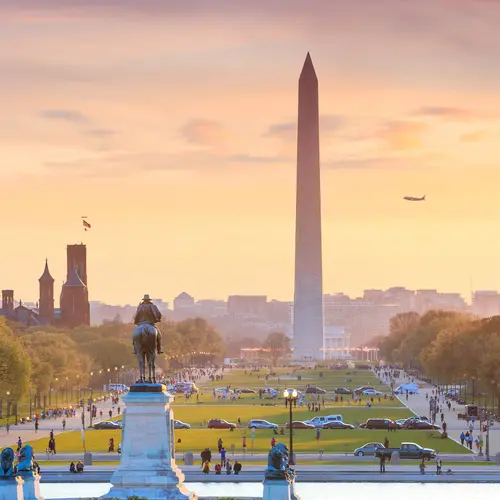
Accommodations
Conveniently connected to the best of Washington, DC! The workshop hotel, Embassy Suites by Hilton Washington DC Chevy Chase Pavilion, is attached to the Friendship Heights Metro Station on the Red Line for easy access.
Because the hotel is about 1.3 miles away from the Earth and Planets Laboratory, we have arranged a shuttle to take people to and from the workshop. More details to come.
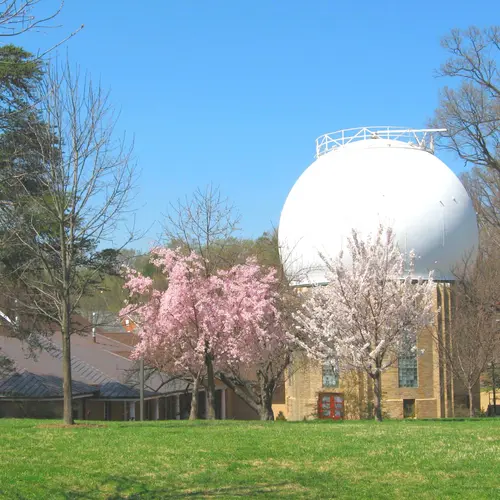
Our Campus
The WISE Workshop will be held on the lush grounds of the Earth and Planets Laboratory in the Greenewalt building. You can find the Greenwalt building sitting nestled next to the historic Atomic Physics Observatory.
Pictured: The Greenewalt building (left) sits to the left of the Atomic Physics Observatory (right.)
Program and Agenda
9:00–9:15 a.m. | Welcome Remarks
Bob Hazen, Michael Walter, Mike Wong
9:15–9:45 | Plenary Talk 1
Heather Demarest: Laws of Nature—How would we know if one is missing?
9:45–10:15 a.m. | Plenary Talk 2
Sarah Marzen: How Do We Use Information Theory in Biology?
10:15–10:45 a.m. | Coffee Break
10:45–11:15 a.m. | Plenary Talk 3
Blaise Aguera y Arcas: An evolving in-silico system
11:15–11:45 a.m. | Plenary Talk 4
Mike Wong: Arrows in Time
11:45 a.m. -12:00 p.m. | Organizational Remarks
Bob Hazen, Mike Wong: WISE Announcements, Breakouts, and Looking Forward
12:00–1:15 p.m | Lunch
1:15–2:30p.m | Breakout Sessions A (Preselected Topics)
2:30–3:00 p.m | Coffee Break
3:00–4:00 p.m | Breakout Sessions B (Preselected Topics)
4:00–5:30 p.m | Poster Session
5:30–7:00 p.m | Dinner
7:00–8:00 p.m | After-Dinner (Keynote)
Adrian Bejan: Constructal Law
9:00–9:30 a.m. | Plenary Talk 5
Irene Chen: Chemical Evolution
9:30–10:00 a.m. | Plenary Talk 6
Rika Anderson: Biological Evolution
10:00–10:30 a.m. | Coffee Break
10:30–11:00 a.m. | Plenary Talk 7
Roberta Raffaeta & Valentina Marcheselli: Technological/Social Evolution
11:00–11:15 a.m. | Organizational Remarks
Mike Wong, Bob Hazen: WISE Announcements, Breakouts, and Looking Forward
11:15 a.m. –12:15 p.m. | Breakout Sessions C (Topics Generated at WISE)
12:15–1:30 p.m. | Group Photo and Lunch
1:30–2:30 p.m. | Breakout Sessions D (Topics Generated at WISE)
2:30–3:00 p.m. | Coffee Break
3:00–4:00 p.m. | Breakout Sessions E (Topics Generated at WISE)
4:00–4:30 p.m. | Coffee Break
4:30–5:45 p.m. | Breakout Session F (Topics Generated at WISE)
5:45–7:15 p.m. | Dinner
7:15—8:15 p.m. | After-Dinner (Keynote)
Stephen Wolfram: Why biological evolution works
9:00–9:15 a.m. | Final Selection of Breakout Topics
9:15–10:30 a.m. | Breakout Sessions G (Topics Generated at WISE)
10:30–11:00 a.m. | Coffee Break
11:00–12:00 a.m. | Full Group Reconvenes to Report Out
12:00 p.m. | WISE Ends
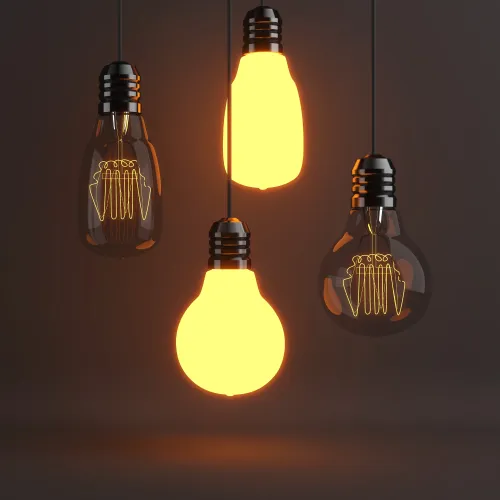
Apply for Mini-WISE Meeting
Announcing the launch of Mini-WISE Meetings, supported by the Templeton Foundation and Carnegie Science. These small, multi-disciplinary workshops, set for 2025-2026, aim to extend the impact of WISE by fostering new collaborations and advancing research on complex evolving systems. Up to 12 teams will receive organizational grants of up to $5,000 to explore topics such as open-ended evolution, the role of information in evolving systems, and more. Eligible teams must include researchers from different institutions and disciplines, with at least two pre-tenure members. Applications are reviewed on a rolling basis.
Learn More and Apply